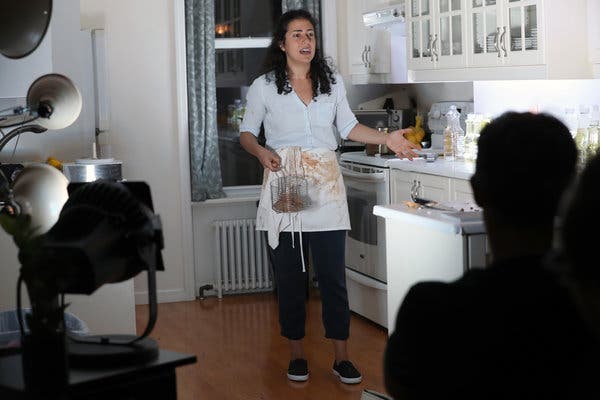For as long as we’ve walked the earth, we’ve made sense of the world through stories. And for thousands of years, the theater has been our most enduring place to share them — a darkened space in which we are invited to imagine alternate worlds, and have our senses activated through the magic of language, lighting, and set design.
It has not been the place we go to experience the sting of freshly chopped onions, or to hear the crackling sizzle of a heated pan.
But a new play, and a new frame for thinking about how and where our dramatic stories can unfold, is changing all that — and making the theater a space in which all our senses can be brought to life in the service of generating a deeper connection to the stories we tell.
The one-woman play, Oh My Sweet Land, is the work of Amir Nizar Zuabi, an award-winning Palestinian playwright; and Corinne Jaber, a German-Syrian actress. It’s based on interviews with Syrian refugees in Jordan, and what unfolds over its 90 minutes is a visceral, personal look at the Syrian refugee crisis — and the brutal war that led up to it.
 The setting is simple and straight-forward: a woman of mixed Syrian-German parentage recalls her encounter with Ashraf, a Syrian man in Paris who charms her and then disappears, prompting the woman to set out in search of him — a journey that leads her to intersect with some of the millions of Syrian refugees in Lebanon and Jordan.
The setting is simple and straight-forward: a woman of mixed Syrian-German parentage recalls her encounter with Ashraf, a Syrian man in Paris who charms her and then disappears, prompting the woman to set out in search of him — a journey that leads her to intersect with some of the millions of Syrian refugees in Lebanon and Jordan.
In this production, however, the nameless woman is not speaking to us from a stage, but from someone’s private kitchen, a place in which only 20 or so people can fit — and a setting the production team only has access to about an hour before the show starts. And while she’s speaking she’s not blocking out rigid stage directions, but preparing kibbeh, a Syrian delicacy. “Since I came back, I make kibbeh again and again,” she says as the show begins, “as if I want to close a hole in my soul with these little pockets of warmth.”
Because of the setting, audience members are likely to be affected by more than just the language. “This man’s imprisonment matters so much more than a pan of onions,” wrote theater critic Alexis Soloski when the play was staged in New York City. “But you are sitting in a cream-colored Brooklyn kitchen and the stove is a lot closer to you than Syria. So it’s the onions that really trouble you. Because surely the steam has turned to smoke. Surely they are burning.”
For Zuabi, that fuller engagement of the senses is part of the point. “Where I come from, hospitality, feeding you, is a core value,” he said. “For me it was a no-brainer that the play needs to do with food and the sensuality of food, because it’s about a culture that’s under attack—not just about the horrors of Syria, but about celebrating what this culture is.”
The intimacy of the setting adds another factor. “The way that this play has been written — it’s poetic, it’s personal, it’s intimate, it’s very vulnerable,” says Torange Yeghiazarian, who directed the play for its San Francisco run. “The storyteller opens herself up and shares intimate details that I hope will entice the audience to also open up and make themselves vulnerable. That’s why we’re having post-play conversations and sharing food. I feel like as a society we’re hungry for that kind of intimate and vulnerable conversation.”
Consequently, Oh, My Sweet Land and efforts like it are reframing the nexus between art and everyday life, in ways that can open us up to a broader emotional experience. “You might feel like a bit of a monster,” Soloski continues, “for fretting about those onions while Ms. Malouf describes people who have suffered torture and worse. Yet this is what makes Mr. Zuabi’s play so devastating. Because yes, it’s about kibbe and sex and stressful journeys across borders. But as you sit crammed together in that pleasant little kitchen, the play is also about our incomplete ability to wrap our heads around a war being fought half a world away, about our finite capacity for empathy.
“Decent people can’t look away from what is happening,” the nameless woman tells herself. But people can and people do, like the woman who will soon look away from us as she removes the kibbe from boiling oil. So we go on — cooking, cleaning, watching plays — and we put slaughter out of our minds. What else can we do?”
Recent Comments